Click here to view in a new window.
Lectionary, Easter 4, Year B
I.Theme – The Good Shepherd

Mafa – I am the Good Shepherd
“Jesus said, ‘I am the good shepherd. The good shepherd lays down his life for the sheep.. And I lay down my life for the sheep. I have other sheep that do not belong to this fold. I must bring them also, and they will listen to my voice. So there will be one flock, one shepherd.’" – John 10:11,16
The lectionary readings are here or individually:
First Reading – Acts 4:5-12
Psalm – Psalm 23
Epistle –1 John 3:16-24
Gospel – John 10:11-18
Easter 4 is traditionally called Good Shepherd Sunday. Today’s readings assure us of God’s constant, shepherd-like care. In his sermon in Acts, Peter preaches that salvation is to be found in Jesus Christ of Nazareth, crucified, but raised from death by God. The author of 1 John tells us that, because of God’s love shown in Jesus, we are now God’s children. In the gospel, Jesus explains how he, as our Good Shepherd, lays down his life because he cares for his sheep.
The image of the shepherd can be difficult to understand. The metaphor of the shepherd has at times been sentimentalized and at other times abused.
Given that tension, what can we learn from today’s gospel? One of its most heartening aspects is the utter commitment of the Shepherd. Some of us might resent being diminished by the comparison to witless sheep. Yet all of us can respond with gratitude to a committed friend. The special people in our lives who know when we need a joke or a nudge, a compliment or a challenge; those who can both laugh and cry with us; those who give us perspective when we’ve lost ours: they are gift. To have as guide One who is the source and inspiration of all those gifts is blessing indeed.
We have been fortunate in our own day to see models lay down their lives for others. Martyrs in Central America and Africa are dramatic examples. Yet in unspectacular ways, ordinary people sacrifice daily for their children, their coworkers, their friends and relatives. Laying down one’s own life may be as simple as pausing to hear the leisurely unfolding of another person’s story when time pressures mount. Or it may be as complex as financing another’s education. But the surrenders we can observe so often around us prove that giving one’s life is both possible and practical.
A second noteworthy element is the lack of coercion exerted by the Shepherd. His voice is all, and it is enough. We often meet with resistance when we try to persuade another. We also witness the remarkable change that inner motivation can produce. Jesus knows well the drawing power of love and the strength of people driven by love.
Visual Lectionary Vanderbilt, Fourth Sunday of Easter, April 21, 2024
Click here to view in a new window.
The SALT Blog for Easter 4, Good Shephard Sunday
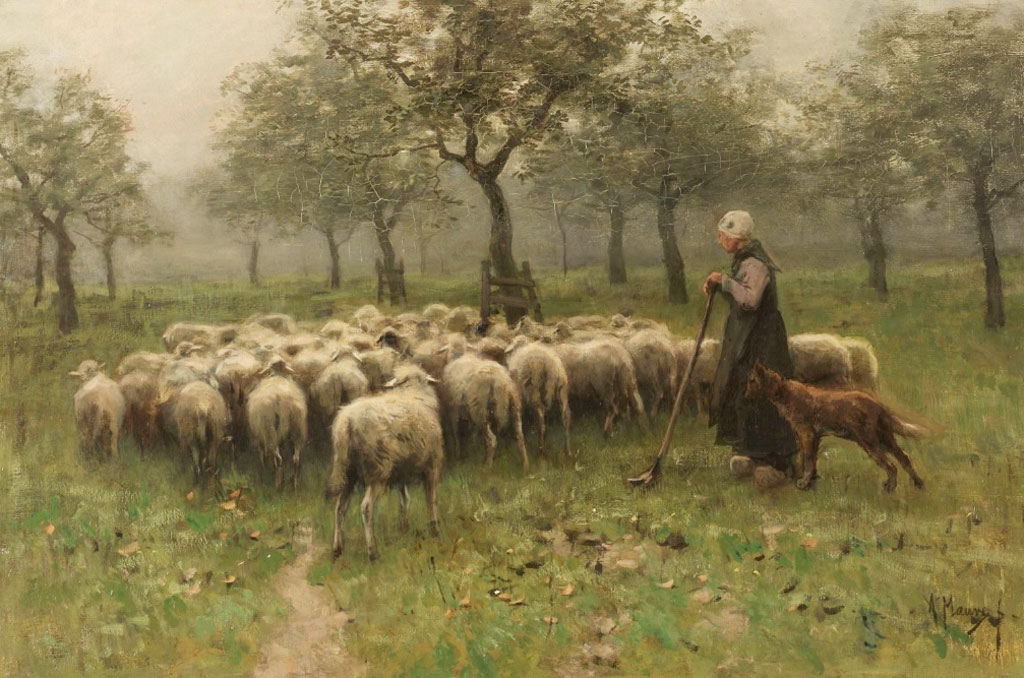
Shepherdess with a Flock of Sheep, by Anton Mauve, c. 1870-88, Dutch painting, oil on canvas
1. This is the 4th week of Eastertide The gospel readings for the first three weeks were resurrection appearance stories; the next four weeks will explore Jesus’ teachings about living in intimacy with God.
2. Many early followers of Jesus would have been familiar with describing the promised messiah as a caring and skillful “shepherd”: Isaiah, Jeremiah, and Ezekiel each use such language, and likewise, Jeremiah, Ezekiel, and Zechariah contrast the divine shepherd with “worthless shepherds” who neglect, exploit, and scatter the flock. For listeners today, Psalm 23 (this week’s psalm) is likely the best-known reference to God as a shepherd, with the “rod and staff” evoking the hazards of the wilderness: the rod is for fending off wolves and lions, and the staff for rescuing sheep trapped in thickets or crevasses.
3. In the phrase “good shepherd,” the Greek word translated as “good” (kalos) means not “morally good” but rather “real and proper” or “true,” as in, “I am the true shepherd” or “I am the genuine shepherd.”
4. The goal of the true shepherd’s work is to give the sheep abundant life. For John, Jesus’ death makes possible this surprising chain of events, this grand reversal and ever-opening entrée into “abundant life.” It’s for the sake of this chain of events, and ultimately that abundant life, that “the good shepherd lays down his life for the sheep.” And what is “abundant life”? According to John, it’s a life of love and intimacy with God . To give the sheep this vibrant fullness of life, Jesus is willing to lay down his own.
5. Both Jesus and Peter frame the crucifixion as an enactment of the psalm’s ancient choreography: a stone is rejected, but it then becomes the cornerstone (or “the keystone”) of an even greater edifice. For Peter, that edifice is the community of the church — and similarly, for John, the fact that Jesus is rejected and killed ultimately makes possible his resurrection, ascension, and the birth of that community. Unbeknownst to his killers, Jesus’ death is just the first act in this larger drama.
6. Beneath and throughout all of this is the dynamic of an ever-expanding circle of salvation. The Jewish messiah, Luke and John and the whole New Testament insists, will also welcome Gentiles ( Jews + Gentiles = everyone!). Jesus ascends and “will draw all people to myself” (John 12:32). In this week’s passage from John, Jesus puts the same theme this way: “I have other sheep that do not belong to this fold” (John 10:16). Precisely who these sheep are is left unspecified; that’s the shepherd’s business, not ours. The practical effect of this teaching for us today is that we dare not imagine anyone to be outside of God’s love and care (even those who reject Jesus!); as Jesus himself hints, in the end the flock may well include “all people” (John 12:32).
What is a Good Shepherd ?
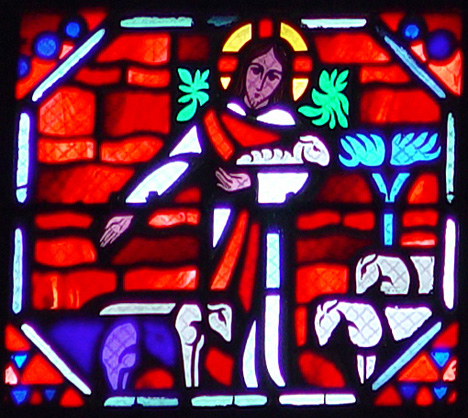
John 10:1-20
- He calls his own sheep by name and leads them out (v3)
- When he has brought out all his own, he goes on ahead of them, and his sheep follow him because they know his voice (v11)
- A willingness to lay down his life for the sheep (v11).
- Personal knowledge of the sheep (v14). I know my sheep and my sheep know me
- A missionary heart for other sheep (v16)
Psalm 23
In this passage, God is described as a shepherd who cares for his sheep. The speaker of the psalm (presumably David, the author of many of the psalms) identifies himself as a sheep who is under God’s care. Here are some of the ways in which God is depicted as a shepherd in this passage:
- God provides for his sheep’s needs (“I shall not want”), leading them to green pastures and still waters where they can find rest and refreshment.
- God guides his sheep on the right path (“he leadeth me in the paths of righteousness”), correcting and restoring them when they go astray.
- God protects his sheep from danger, even in the midst of the darkest valley (“though I walk through the valley of the shadow of death, I will fear no evil: for thou art with me”).
- God provides comfort and sustenance in times of hardship (“thy rod and thy staff they comfort me”; “thou preparest a table before me in the presence of mine enemies”).
- God promises to care for his sheep always, and to welcome them into his house (“surely goodness and mercy shall follow me all the days of my life: and I will dwell in the house of the Lord forever”).
Another passage in the Old Testament where God is depicted as a shepherd is Ezekiel 34. In this chapter, God rebukes the leaders of Israel for their failure to care for their people and promises to be a shepherd to them himself. Here are some of the ways in which God is described as a shepherd in Ezekiel 34:
- God seeks out his lost sheep, rescuing them from danger and bringing them back to safety (“I will seek that which was lost, and bring again that which was driven away”).
- God provides for his sheep’s needs, giving them food and water and protecting them from predators (“I will feed them in a good pasture, and upon the high mountains of Israel shall their fold be: there shall they lie in a good fold, and in a fat pasture shall they feed upon the mountains of Israel”).
- God cares for his sheep’s physical and emotional well-being, healing their wounds and strengthening the weak (“I will bind up that which was broken, and will strengthen that which was sick”).
- God judges between the strong and the weak, ensuring that justice is done and that the vulnerable are protected (“I will judge between cattle and cattle, and between rams and he goats”).
- God promises to be with his people always, watching over them and bringing them to a place of safety and abundance (“And I will make with them a covenant of peace, and will cause the evil beasts to cease out of the land: and they shall dwell safely in the wilderness, and sleep in the woods
The Good Shepherd in our hymns

“The Good Shepherd” – Jorge Cocco
The hymns today speak of the qualities of the Good Shepherd
1 Savior, like a shepherd lead us . Author Dorothy Ann Thrupp (1779-1847) speaks of Jesus as guardian of us in our lives, keeping away from sin and coming after us when we go astray, freeing us in the process. She calls upon Jesus help us do His Will in general
Thrupp compiled several hymnbooks for children. Savior Like a Shepherd Lead Us appeared unsigned in her Hymns for the Young, published in 1836, but is commonly attributed to her.
Voices on Good Shepherd Sunday
1. Br. James Koester, SSJE/
The good news is that we don’t need to be perfect. We only need to be found. We give thanks that the Good Shepherd continues to search for us, so that one day we will be found, gathered into his arms, and brought home.
2. David Lose – "God is Not Done Yet"
![]()
Amid Jesus’ discourse on being “the good shepherd,” what jumped out to me this time was Jesus’ simply but bold assertion that, “I have other sheep that do not belong to this fold. I must bring them also, and they will listen to my voice. So there will be one flock, one shepherd.” Have you ever noticed that before? Or, more than notice it, have you ever given much thought to its theological and homiletical implications?
What strikes me is that, quite simply, Jesus isn’t done yet. Despite his healings, despite his preaching, despite all that he had already done and planned to do, Jesus isn’t done yet. He still has more sheep to reach, sheep that are not in this fold. By extension, I’d suggest that God isn’t done yet, either. And this matters for at least three reasons.
Maximilian Kolbe – a caring shepherd among his people
From a sermon by Rev. William D. Oldland, "Jesus is the Shepherd and the Gate" about Maximiliam Kolbe

"His life exemplifies the role of a caring shepherd for his flock. His life is also a gate or perhaps a gateway through which we can see the effect of the incredible love of God.
"The priest’s name was Maximilian Kolbe. He was born in 1894 in Poland. His parents were poor. His father was a weaver. At an early age he had a vision. He had prayed to Mary and asked what was to become of him. In response Mary came to him in this vision holding two crowns. One was red and the other was white. The white one symbolized perseverance in purity and the red one meant martyrdom. She asked which one he would choose. He said he would accept them both. This decision shaped his future actions and would one day come true.
Good Shepherd.. in the movies
In the Old Testament, Shepherds are used to represent leaders of God’s people (see Isaiah 63:11; Jeremiah 23:2). Shepherds watch for enemies who might attack the sheep, and they defend them when necessary. They tend to sick or wounded sheep and search for and rescue lost or trapped ones.
In Christ’s teachings, shepherds love their sheep and try to earn their trust. The sheep know, love, and trust the shepherd above all others. A good shepherd will even die for his sheep. Christ contrasts the shepherd with the hireling, who deserts the sheep in times of danger because he does not love them.
There are movies where the main character exhibit this behavior.
One of Jack Nicholson’s early films was “One Flew over the Cukoo Nest” (1975). Randall McMurphy (Jack Nicholson) is sent from the state penitentiary to a mental hospital in order to be evaluated. McMurphy is promptly situated as the deviant who will challenge the establishment, embodied principally by the villainous Nurse Ratched. Randall demands to know what medication is being administered to him, attempts to teach fellow patients basketball and black jack, and instigates a futile campaign to have the schedule altered so that everyone may watch the World Series. His threat to the stability of the institution is finally acknowledged by the Board after he commandeers the hospital bus in order to take his disciples on a fishing expedition. The group gradually questions the hospital’s procedures. A violent uproar ensues, causing Randall’s beloved disciple “Chief” (Will Samson) to physically assault a ward who attempts to subdue McMurphy.
After the administration of corrective shock treatment to the dissenters, McMurphy begins to persuade the others to leave the institution, a premise they resist due to a lack of faith in their own capabilities to function on the outside.

In the concluding sequence, it is obvious that McMurphy has empowered at least one of his disciples to do what was once unthinkable. “Chief” hurls a limestone bathroom fixture through the window and escapes the hospital. The rush of water at the beginning of the scene can be linked to baptism.
The 23rd Psalm Sung by Bobby McFerrin
From the SALT Project. “From the SALT project. “Bobby McFerrin’s virtuosic reimagining of that ancient, beloved song.
“The translation helps us hear the lyrics afresh, and the musical setting helps us feel the song’s emotional depths, echoing across the centuries.”
Bobby McFerrins VOCAbuLarieS featuring SLIXS & Friends, live in Gdansk, Poland at the Solidarity of Arts Festival, 17 August 2013
Earth Day 2024

Earth Day originated in 1970 after Sen. Gaylord Nelson from Wisconsin witnessed the ravages of the 1969 massive oil spill in Santa Barbara, California. He hoped it would force environmental protection onto the national political agenda. It did lead to the creation of the Environmental Protection Agency, the passage of the Clean Air Act and a dialogue on a host of issues. In our time it focuses on climate change
The theme in 2024 is “Planet vs. Plastics”. The organizing arm earthday.org has the main goal of a 60% reduction in the production of plastics by 2040.
To achieve a 60% reduction by 2040, earthday.org goals are: (1) promoting widespread public awareness of the damage done by plastic (2) rapidly phasing out all single use plastics by 2030 and achieving this phase out commitment in the United Nations Treaty on Plastic Pollution in 2024 (3) demanding policies ending the vast amount of plastic the fashion industry produces and uses (4) investing in technologies to build a plastics-free world.
Plastics are a threat to human health. As plastics break down into microplastics, they release toxic chemicals into our food and water sources and circulate through the air we breathe.
Scientists have found microplastics — or their tinier cousins, nanoplastics — embedded in the human placenta, in blood, in the heart and in the liver and bowels. Plastics can also carry other chemicals not involved in their production: “hitchhikers” absorbed onto plastics and later potentially released into the human body.
The chemicals in plastics have been linked to a variety of issues, including reproductive harm and obesity, organ problems, and developmental delays in children. Ingesting these plastics causes cell damage, which could lead to inflammation and allergic reactions, and once consumed, removing microplastics from your body is not an easy process.
Plastics surround us with the use of plastic bags, plastic containers, packaging materials and garments. (70% from crude oil releasing microfibers ). The small fragments linger for centuries. Animals die from our distribution of plastics
Cigarette butts (whose filters contain tiny plastic fibers), food wrappers, plastic bottles, plastic bottle caps, plastic grocery bags, plastic straws and plastic stirrers are among the most common pollutants.
In 1950, the world produced 2 million metric tons of plastic; in 2019, that number had grown to a staggering 460 million tons. And when that plastic breaks down, it splits into tinier and tinier pieces that can slide more easily into the human body.
Plastics can take anywhere from 20 to 500 years to decompose, depending on the material’s structure and environmental factors such as sunlight exposure.
Less than 14% of plastic packaging is recycled. With plastics being composed of several different polymer types, it is nearly impossible to recycle different plastics together as they melt at different temperatures.
Additionally, to be recycled properly, plastics need to be separated. This is not only time consuming, but costly.
Links
1. Disposable plastics
2. Single use plastics
3. Ocean plastics
4. Microplastics
5. Threat to human health
Take action
1. Sign the Global Plastic Treaty
2. Educate yourself on plastics
3. Reject fast fashion
4. Take a Plastic Quiz
Manage Your Plastic Use
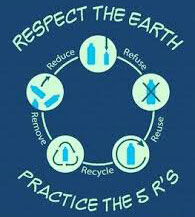 Individually we cannot change industries or policies but we can make manageable changes in our lifestyles to counter the threats.
Individually we cannot change industries or policies but we can make manageable changes in our lifestyles to counter the threats.
Earthday.org calls these the 5R’s- Reduce, Refuse, Reuse, Recycle and Remove
1. Reduce – Before you shop…
Ask yourself two questions when considering plastic products or products with plastic packaging – Do I need it? Can I use something else?
2. Refuse – Say “no” to plastics
The substitutes for plastics are the ones you choose which can make a contribution to the environment.
Some key tips
A. Avoid plastic straws – use metal or wood/paper based straws.
B. Use reusable shopping bags. And buy cloth or mesh bags to carry fresh produce to the cashier.
C. Select products without plastic packaging.
D. Note products that use plastic microfibers – such as nylon and polyester
E. Bring your own coffee cup to the coffee shop.
3. Reuse – Avoid single-use plastics
Use dishes, glasses, and metal silverware instead of their plastic counterparts.
Avoid plastic items going to the dump – When you finally decide to get rid of old clothes, toys, furniture, or electronics, donate them rather than throwing them away.
For young parents -Trying washable reusable cloth diapers instead of disposable ones.
Any food containers from restaurants are durable enough to be reused for kitchen storage. Make sure to wash them by hand—putting them in the dishwasher can expose you to toxins.
4. Recycle -Know your waste management company/county. This is not the best choice when dealing with plastics. It cannot replace the need for reducing consumption or refusing and reusing plastics when you can.
If you have to throw away something, segregate it and give it a chance to be recycled!. If recycling is the best option, you should do so following the rules of your community.
For Caroline county -Eric Johnson is the Solid Waste Superintendent email – ejohnson@co.caroline.va.us or phone number (804)572-6301.
For the most part, only recycle if you are positive that the item is truly recyclable.
5. Remove – “Get it outta here!
Plastic/litter clean-ups are great community events that let you meet the people who live around you while cleaning up your local community at the same time.
I try to take an hour or two to walk different paths in the neighborhood to pick up trash. The walking and stretching are good exercises and help the community at the same time.
Biodegradable plastics have emerged as a potential solution and are made from natural sources like plant-based materials and micro-organisms such as bacteria that can be used in a variety of industries such as packaging, construction, and healthcare.
Parish Creation Care Committee – Additional ideas for Earth Day
From the Diocese of Connecticut, April 12, 2024
1. Purchase silicone containers as a substitute for plastic containers from restaurants for takeout
From St. Peter’s, Cheshire, CT
A Campaign to Minimize Single-Use Plastic and Food Waste -Contain&Sustain* was awarded *The Jack Spaeth Creation Care Environmental Grant* through ECCT and gained additional financial support from St. Peter’s ECW fund. In late July we launched a matching grant community crowdfunding campaign through Sustainable CT that ended Sept. 2.We reached our $3,000 donation goal and earned the 1.5 dollar-for-dollar match to equal $7,633.30!**
These funds purchased 1700 compact, reusable silicone take-away food containers, which we are distributing FREE to community members. Our goal is to build awareness of food waste AND the waste caused by single-use plastic/styrofoam carry-out containers AND to change behavior to minimize their use in Cheshire
2. Use sneaker collection Highland Elementary, is doing a sneaker recycling drive for Earth Day. Used sneakers will be collected and sent to a company that recycles them and keeps them out of landfills.

A Poem for Earth Day

“The Peace of Wild Things” by Wendell Berry
When despair for the world grows in me
and I wake in the night at the least sound
in fear of what my life and my children’s lives may be,
I go and lie down where the wood drake
rests in his beauty on the water, and the great heron feeds.
I come into the peace of wild things
who do not tax their lives with forethought
of grief. I come into the presence of still water.
And I feel above me the day-blind stars
waiting with their light. For a time
I rest in the grace of the world, and am free.
Village Harvest, April 2024 – “Low numbers, however they got a lot of nice stuff.”
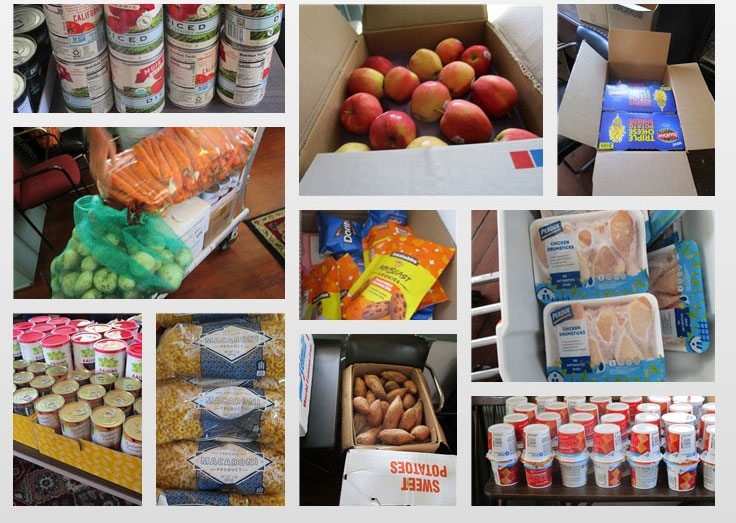
April, 2024 brought 77 people to the Village Harvest. it was the 3rd lowest total over the year and is below March’s 90. 77 is also below the 6th-month average of 98. Our range over the 6 months has extended from 77 to 112 in December 2023. A year ago in April, the total was 104.
Food sources were also lower at 1,242 pounds in April compared to 1,322 pounds last month. Like the client totals food was the 3rd lowest in a year. However, unlike with clients, April’s total was above the 12-month average. 1,242 pounds was above the 6th month average of 1,217. A year ago in April 2023 pounds were higher at 1,365.
The composition of food in April, 2024 was closer to other Aprils (except for April 2023) at 38% produce, 45%, and 17% meat. (Last year, April 2023, produce was significantly higher at 51% ). Generally, grocery has been higher than produce by 10 percentage points at this time of the year
Pounds per person is a measure that tries to relate client and food trends. How much food did the typical client receive? Despite the totals being lower in both clients and pounds this month, pounds per person were at a 12-month high at 16.1. The 6 months average is 13 as was a year ago in April, 2023. Pounds per person was at the highest level since July 2023 at 16.75. As Elizabeth remarked “Low numbers, however they got a lot of nice stuff.”
St. Mark’s Day, April 25

John Mark is the author of the Gospel of Mark which we read in Year B.
The painting was done in 1625 by Frans Hals, a Dutch painter, who painted portraits of all the Gospel writers.
Mark’s work was the first Gospel probably written in the 60’s AD. Gospel means “Good News” of Jesus Christ reflecting His life and work. The Gospel says the Kingdom of God is at hand and brings new life, sanctification and hope to the world. It is also one of the Synoptic Gospels.
Portland Guitar, April 19 concert
They will be performing music written for two guitars at St. Peter’s, Friday, April 19 at 7pm as part of our annual concert series. (Reception 6:15pm in the Parish House.)
The concert is free but donations gratefully accepted for future concerts, held yearly since 2013. This is our 10th concert.

The Portland Guitar Duo are James Manuele and Foti Lycouridis and have been playing together since 1999.
Foti shared some of the details of the concert – “This time we will do a program of 19th century music on copies of period instruments. It will be mostly transcriptions of piano music of the period along with a few duets and solos written for guitar/guitars. We will also talk about the guitar history of that particular time. As performers and researchers we are very interested in music of other media that we can play on guitar, and piano music of that period has a very rich repertoire to draw from.”
Born in California, James Manuele began playing the guitar at age eleven. He earned his Bachelor of Music degree at Mansfield University, where he also studied voice and viola. Later, he earned his Masters of Music in Guitar Performance at Portland State University and has taught in colleges -Clark College in Vancouver and at Concordia in Portland.
Foti Lycouridis was born in Egypt of Greek parents. In 1981, he started his music education at the University of Portland. He holds a Bachelor’s degree in Guitar Performance and a Master’s in Music Theory. He also can perform on a 10-string guitar and Baroque lute.
A. Here is a 3 minute summary of the Duo:
B. Live
1. Part 1 of a set for the Portland Community Media.
2. Part 2 of a set for the Portland Community Media.
3. “Miller’s Dance” by Manuel de Falla
4. At Oregon State University. “Spanish Dance no. 2 ‘Oriental'” by E. Granados”
5.
“The Caprice” by Isaac Albeniz
Jesus’ Appearances

On Easter 2 we had the story of Thomas. Here is a timeline of Jesus’ appearances but there is complete account here.
Sunday’s Links, April 14, 2024
Easter 3, April 14
Lector: Ben Hicks
Chalice Bearer: Andrea Pogue
Altar Clean up: BJ Anderson
Coming up!
Recent Articles, April 14, 2024
Eastertide
Celebrate Eastertide
Bulletin
Sermon
Photos
Videos
Lectionary, 11am service
Commentary
Vanderbilt Visual Lectionary
The difference of resurrection
The Psalms – Hope
SALT Blog – Dealing with the issues of a Risen Christ
Time for Tulips
Flashback to Holy Week and Easter
Best of Holy Week – Photos
Best of Holy Week – Words
Holy Week category
Ministries
April newsletter
ECW Spring meeting, April 9
Team Up to clean up event, April 20
Breakfast program in Jamaica
Portland Guitar Duo at St. Peter’s
Help us advertise the concert!
Past Concerts at St. Peter’s
Village Harvest, March, 2024
Village Harvest, Feb., 2024
Creeds class notes 5 sessions- Conclusion
God’s Garden collection
Sacred Ground, Jan., 2024
Sacred Ground, Feb., 2024
Sermon, Rev. Tom Hughes, April 14, 2024 – “In the final chapter of life.. we shall be like Christ”
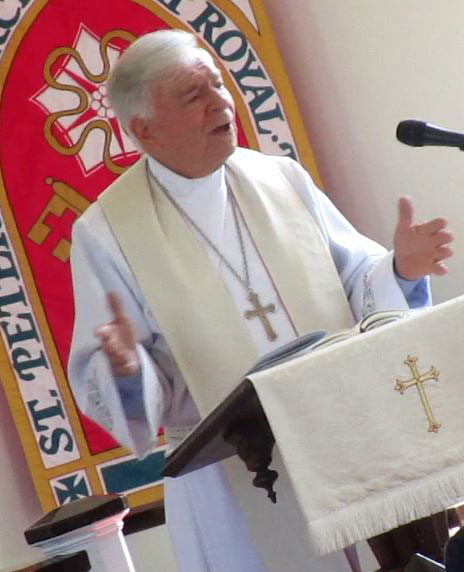
1 John 3:1-7 “See what love the Father has given us, that we should be called children of God; and that is what we are. The reason the world does not know us is that it did not know him. Beloved, we are God’s children now; what we will be has not yet been revealed. What we do know is this: when he is revealed, we will be like him, for we will see him as he is. And all who have this hope in him purify themselves, just as he is pure.”
Sermon
Nice to be together. This beautiful Sunday feels like spring this Sunday. Last Sunday if you recall it, we weren’t sure, but here we are gathered again today in the Lord’s House to read and reflect on the words that have been given to us
One of the things that we spent a couple of minutes on last week was talking about symbols and I want to go back to that.
I could begin there because symbols are so important not just in the Christian life for which they are central. In life in general if you’re dealing about faith and issues about eternal life, knowing God when we’re talking about things like that, it’s hard to think about and practically impossible to talk about them because they’re just not adequate words. We’re not able to think in ways that will enable us to speak the truest things, the things that are the hardest ones, to give voice to that. Being the case then, we have to represent those things in symbols.
The greatest symbol of all time in all of human history is the cross. Even if you’re an enemy of Christ, if you’re an enemy of the cross, the cross is still the most significant thing as a symbol that there’s ever been and I’m sure ever will be because it captures everything about life now. If you’re familiar with philosophy and writings of the past and poetry certainly scripture, another very powerful image and a symbol is the idea of the road being on the road. We live life out on the road – that’s where things happen. I’m probably the only one here that can remember the Bing Crosby and Bob Hope movies on the road shows – you know the Road to Singapore and the Road toward Mandalay. They were so funny I laughed till my stomach hurt but they’re all about being on the road and things happened on the road. That was the point Willie Nelson sings about being on the road. It’s a theme that runs through all of literature, music, and history being on the road.
Photos, Sunday April 14, Third Easter
This was a beautiful Sunday, mild with the green coming out into force on the trees and plants. We had 18 in attendance.
Brad, our organist, was out with Covid. Luckily, there is a deputy in Caroline County who is an experienced organist we had befriended and had used our organ for practice . The congregation was wowed with his offertory.
Tom’s sermon was largely from 1 John- “What we do know is this: when he is revealed, we will be like him, for we will see him as he is.” See the sermon
Busy week with the Village Harvest on Wed (April 17), Portland Guitar Duo on Friday (April 19) and “Team up to Clean Up” trash in Port Royal on Sat. (April 20)
